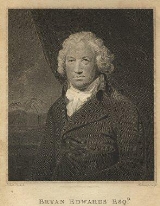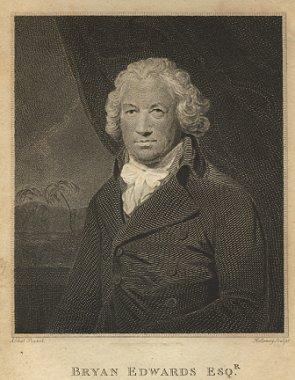
Bryan Edwards
Encyclopedia

England
England is a country that is part of the United Kingdom. It shares land borders with Scotland to the north and Wales to the west; the Irish Sea is to the north west, the Celtic Sea to the south west, with the North Sea to the east and the English Channel to the south separating it from continental...
politician
Politician
A politician, political leader, or political figure is an individual who is involved in influencing public policy and decision making...
and historian
Historian
A historian is a person who studies and writes about the past and is regarded as an authority on it. Historians are concerned with the continuous, methodical narrative and research of past events as relating to the human race; as well as the study of all history in time. If the individual is...
born in Westbury, Wiltshire
Westbury, Wiltshire
Westbury is a town and civil parish in the west of the English county of Wiltshire, most famous for the Westbury White Horse.-Name:The most likely origin of the West- in Westbury is simply that the town is near the western edge of the county of Wiltshire, the bounds of which have been much the same...
. Edwards supported the slave trade, and was described by abolitionist
Abolitionism
Abolitionism is a movement to end slavery.In western Europe and the Americas abolitionism was a movement to end the slave trade and set slaves free. At the behest of Dominican priest Bartolomé de las Casas who was shocked at the treatment of natives in the New World, Spain enacted the first...
William Wilberforce
William Wilberforce
William Wilberforce was a British politician, a philanthropist and a leader of the movement to abolish the slave trade. A native of Kingston upon Hull, Yorkshire, he began his political career in 1780, eventually becoming the independent Member of Parliament for Yorkshire...
as a powerful opponent.
Life
Edwards' father died in 1756, and his maintenance and education were undertaken by his maternal uncle, Zachary Bayly, a wealthy merchant in JamaicaJamaica
Jamaica is an island nation of the Greater Antilles, in length, up to in width and 10,990 square kilometres in area. It is situated in the Caribbean Sea, about south of Cuba, and west of Hispaniola, the island harbouring the nation-states Haiti and the Dominican Republic...
. About 1759 Edwards joined his uncle there and Bayly engaged a private tutor to complete the boy's education. When Bayly died Edwards inherited his wealth, and in 1773 also succeeded to the estate of another Jamaica resident named Efume.
Edwards soon became a leading member of the colonial assembly of Jamaica, but in a few years returned to England. In 1782 he tried and failed to secure a seat in parliament
Parliament of the United Kingdom
The Parliament of the United Kingdom of Great Britain and Northern Ireland is the supreme legislative body in the United Kingdom, British Crown dependencies and British overseas territories, located in London...
as member
Member of Parliament
A Member of Parliament is a representative of the voters to a :parliament. In many countries with bicameral parliaments, the term applies specifically to members of the lower house, as upper houses often have a different title, such as senate, and thus also have different titles for its members,...
for Chichester
Chichester (UK Parliament constituency)
Chichester is a county constituency in West Sussex, represented in the House of Commons of the Parliament of the United Kingdom. It elects one Member of Parliament by the first past the post system of election....
. He was in Jamaica again from 1787 to 1792. He then settled in England as a West India merchant, making another futile attempt to enter parliament in 1795, this time standing in Southampton
Southampton (UK Parliament constituency)
Southampton was a parliamentary constituency which was represented in the British House of Commons. Centred on the town of Southampton, it returned two Members of Parliament from 1295 until it was abolished for the 1950 general election....
. In 1796, however, he became member of parliament for Grampound
Grampound (UK Parliament constituency)
Grampound in Cornwall, was a borough constituency of the House of Commons of the Parliament of England, then of the Parliament of Great Britain from 1707 to 1800 and of the Parliament of the United Kingdom from 1801 to 1821. It was represented by two Members of Parliament.-History:Grampound's...
, a notoriously corrupt Cornish
Cornwall
Cornwall is a unitary authority and ceremonial county of England, within the United Kingdom. It is bordered to the north and west by the Celtic Sea, to the south by the English Channel, and to the east by the county of Devon, over the River Tamar. Cornwall has a population of , and covers an area of...
borough. Edwards retained this seat until his death at Southampton in July 1800. He left an only son, Hume, by his wife, Martha, daughter of Thomas Phipps of Westbury.
Works
In 1784 Edwards wrote Thoughts on the late Proceedings of Government respecting the Trade of the West India Islands with the United States of America, in which he attacked the restrictions placed by the government upon trade with the United StatesUnited States
The United States of America is a federal constitutional republic comprising fifty states and a federal district...
. In 1793 he published in two volumes the History, Civil and Commercial, of the British Colonies in the West Indies, and in 1797 published his Historical Survey of the French Colony in the Island of St Domingo. The latter two titles were later republished, with some additional material, as the History of the British Colonies in the West Indies, in three volumes. This has been translated into German
German language
German is a West Germanic language, related to and classified alongside English and Dutch. With an estimated 90 – 98 million native speakers, German is one of the world's major languages and is the most widely-spoken first language in the European Union....
and, in part, into French
French language
French is a Romance language spoken as a first language in France, the Romandy region in Switzerland, Wallonia and Brussels in Belgium, Monaco, the regions of Quebec and Acadia in Canada, and by various communities elsewhere. Second-language speakers of French are distributed throughout many parts...
and Spanish
Spanish language
Spanish , also known as Castilian , is a Romance language in the Ibero-Romance group that evolved from several languages and dialects in central-northern Iberia around the 9th century and gradually spread with the expansion of the Kingdom of Castile into central and southern Iberia during the...
. A fifth edition was issued in 1819.
When Mungo Park
Mungo Park (explorer)
Mungo Park was a Scottish explorer of the African continent. He was credited as being the first Westerner to encounter the Niger River.-Early life:...
returned in 1796 from his celebrated journey in Africa
Africa
Africa is the world's second largest and second most populous continent, after Asia. At about 30.2 million km² including adjacent islands, it covers 6% of the Earth's total surface area and 20.4% of the total land area...
, Edwards drew up from Park's narrative an account of his travels. Edwards was secretary of the Association for Promoting the Discovery of the Interior Parts of Africa, which published this piece in their Proceedings. When Park wrote his own account of his journeys he availed himself of Edwards' assistance.
Edwards also wrote some poems and some other works relating to the history of the West Indies.

